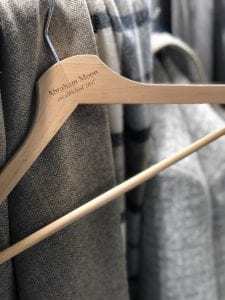Sustainable developments in the UK textile industry
10/03/2020
The UK textile industry has a global reputation for supplying some of the finest fabrics to the world’s most prestigious luxury brands, designers and tailors. Today’s companies are blending heritage techniques developed over hundreds of years with the latest technology, and combining artisan craftsmanship with sustainable practices.
As part of UKFT’s campaign to showcase the unique strengths of the UK textile industry, we asked leading UK mills and manufacturers to outline their latest sustainability developments. Read about them here…
Stephen Walters makes sustainable developments in its 300th year
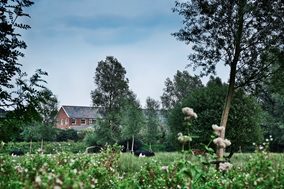
Stephen Walters is committed to building a sustainable business and have many initiatives which drive activity and progress in the area.
There are 40 looms in operation at the mill weaving a wide range of fabrics to order with exceptional quality. All weaving takes place on site by our highly skilled weavers and technicians before every metre of fabric is inspected by hand prior to leaving the mill.
The company has identified four sections of what we call our Sustainability Wheel – these sections are Environmental, Products, Processes and Social – and it constantly reviews and plans projects under each segment which make up this wheel.
Moving towards Zero Waste at Abraham Moon
Abraham Moon
Established in 1837, Moon is renowned for its strong heritage combined with innovative use of colour and design. Its latest collection for spring 2021 offers new combinations of lambswool with linen and also cotton and worsted. New stock-supported worsted jacketing designs complement the existing offer.
Abraham Moon, one of the last remaining vertical woollen mills in the UK and based in Guiseley in West Yorkshire, told us it is working towards zero waste, investing in more energy-efficient machinery and green energy, as well as reducing single-use plastics throughout the mill. It also predominantly works with wool, a versatile fibre with many natural benefits.
Holland & Sherry launches fabric featuring Scottish Merino wool
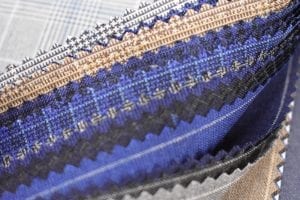
Holland & Sherry Monadh Mor
Holland & Sherry has developed a new fabric that features wool sourced from a unique flock of Merino sheep bred and raised in Scotland.
The Monadh Mor collection is a world-first and exclusive to Holland & Sherry, woven in England from Scottish merino wool. The range includes a 235gsm suiting fabric in a 50% Super 120s Scottish Merino, 35% Super 140s worsted and 15% silk blend.
Linton Tweeds develops new designs with recycled and bio yarns
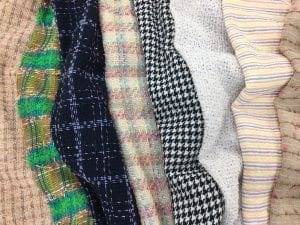
Linton Tweeds
Linton Tweeds has been producing fabrics of the highest quality for fashion houses around the world for more than 100 years. All of these fabrics are still designed and woven on site at its mill on Shaddongate in Carlisle, just as when the company was first founded by William Linton in 1912.
The company works with fashion houses in London, Milan and New York, in markets across Europe, North America and Asia, and with luxury brands such as Simone Rocha, Balmain and Dolce & Gabbana.
A standard Linton tweed might comprise eight different types of yarn – whether that’s wool, silk, velvet ribbon, eyelash, lurex or anything else. The firm likes to push the limits of what a tweed can be, and most recently, this includes new designs with recycled and bio yarns.
Lochcarron of Scotland launches tweed with recycled yarn
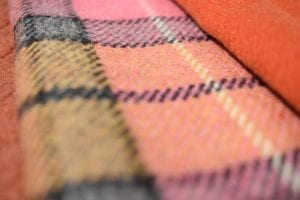
Lochcarron of Scotland 2661C tweed
Lochcarron of Scotland boasts a heritage dating back to 1892, and is a leading manufacturer of tartan. The company offers a range of luxurious check fabrics and authentic tartans that are proudly Made in Scotland by skilled craftsmen and women who design, dye, warp, weave, mend and tailor at its mill in Selkirk.
The largest remaining working textile mill in the heart of the Scottish Borders, Lochcarron of Scotland is based in the beautiful Scottish Borders town of Selkirk, where there is a long and rich history with the textile industry.
For SS21, the company has developed a new tweed fabric called the 2661C tweed, which is woven using an innovative 100% recycled yarn. The yarn is created from garments which are shredded and then spun into yarn.
Piñatex leather alternative made from pineapple leaf fibre
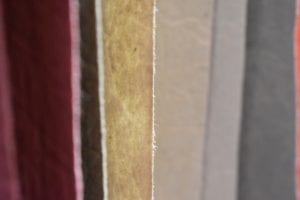
Piñatex
Piñatex by Ananas Anam is a natural, nonwoven material made from pineapple leaf fibre which can be used as an alternative to leather and petroleum-based textiles.
“All Piñatex materials are sustainable as it is made from waste pineapple leaves and the manufacturing of the textile abides by the cradle to cradle philosophy,” Em Mendoza, sales and marketing manager at London-based Ananas Anam, tells UKFT. “The production of Piñatex provides a second stream income as well for the farmers that we work with in the Philippines so that they can provide for a more stable lifestyle for their families.”
She said the company works with a mix of international brands, such as Hugo Boss, independent designers and workshops. The minimum order for the material is 1m.
UKFT’s campaign to promote the fantastic capabilities of the UK textile industry, developed in partnership with The Clothworkers’ Company, is on-going. To find out more or be involved, please contact textiles@ukft.org

